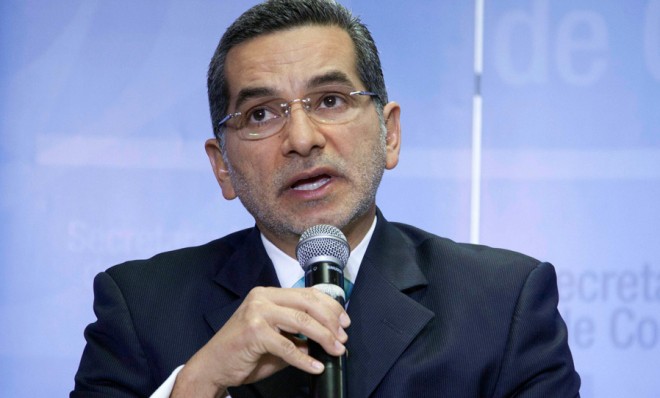Did Ecuador just sabotage its own economy to protect Edward Snowden?
The South American country renounces trade privileges that the U.S. has threatened to pull if Ecuador grants the NSA leaker asylum


A free daily email with the biggest news stories of the day – and the best features from TheWeek.com
You are now subscribed
Your newsletter sign-up was successful
Some U.S. lawmakers have threatened to revoke valuable trade privileges if Ecuador grants NSA leaker Edward Snowden asylum, but the South American nation is not going to give them the satisfaction. The government of President Rafael Correa announced Thursday that it was "unilaterally and irrevocably" renouncing preferential tariffs on products such as roses, shrimp, and frozen vegetables that were worth $23 million per year.
Correa's admirers applauded him for rejecting what his spokesman called Washington's attempt to "blackmail" Correa into turning away Snowden, who faces espionage charges back in the U.S. Amitabh Pal at The Progressive said Correa was risking economic damage to stand up for principle. "The government of Ecuador won't be bullied by Washington," Pal wrote. "By signaling that it is willing to put its money on the line, Ecuador has told the Obama administration that the writ of the United States does not run large in South America."
The loss of the breaks Ecuador was receiving under the Andean Trade Promotion and Drug Eradication Act affects more than 800 products. Oil, which accounted for $5.4 billion of Ecuador's $9.3 billion in exports to the U.S. in 2012, is the big one. Cut flowers come next at $166 million last year, followed by fruits and vegetables, at $122 million.
The Week
Escape your echo chamber. Get the facts behind the news, plus analysis from multiple perspectives.

Sign up for The Week's Free Newsletters
From our morning news briefing to a weekly Good News Newsletter, get the best of The Week delivered directly to your inbox.
From our morning news briefing to a weekly Good News Newsletter, get the best of The Week delivered directly to your inbox.
How badly will this hurt, then? The U.S. is Ecuador's biggest trading partner, buying 40 percent of the country's exports, and, as Politico notes, "any weakening of their relationship could deal a blow to its economy" — especially since this spat could escalate and jeopardize other trade programs. Alicia P.Q. Wittmeyer at Foreign Policy points out that "trade between the United States and Ecuador won't grind to a halt," but Ecuador's ambassador to the U.S., Nathalie Cely, estimated last year that the country could lose 40,000 jobs if the trade perks went away.
That could be tough for a small nation that has depended heavily on loans from China since defaulting on part of its debt in 2008, Wittmeyer points out. Correa's government wants to send the message that it puts principles before money, she says, "but Ecuador's flower and broccoli farmers may not be feeling quite so excited about the national showmanship inspired by the Snowden affair."
Even if the remarks do sting, it's hard to deny that there's an element of theater here, particularly because Correa's government mockingly suggested that the Obama administration should use the $23 million — the value of the lost trade breaks — to finance "human rights training" in Washington. And Michael Weissenstein and Julie Pace at The Associated Press say the move was just "a dramatic but mostly symbolic threat." The tariff breaks were expiring in a few weeks, anyway, and Congress was probably not going to renew them — at least not all of them — for reasons unrelated to Snowden. Besides, Weissenstein and Pace say, the Ecuadorian government probably wouldn't "be able to unilaterally cancel tariff benefits that went directly to their country's exporters," even if it tried.
A free daily email with the biggest news stories of the day – and the best features from TheWeek.com
Harold Maass is a contributing editor at The Week. He has been writing for The Week since the 2001 debut of the U.S. print edition and served as editor of TheWeek.com when it launched in 2008. Harold started his career as a newspaper reporter in South Florida and Haiti. He has previously worked for a variety of news outlets, including The Miami Herald, ABC News and Fox News, and for several years wrote a daily roundup of financial news for The Week and Yahoo Finance.
-
 5 blacked out cartoons about the Epstein file redactions
5 blacked out cartoons about the Epstein file redactionsCartoons Artists take on hidden identities, a censored presidential seal, and more
-
 How Democrats are turning DOJ lemons into partisan lemonade
How Democrats are turning DOJ lemons into partisan lemonadeTODAY’S BIG QUESTION As the Trump administration continues to try — and fail — at indicting its political enemies, Democratic lawmakers have begun seizing the moment for themselves
-
 ICE’s new targets post-Minnesota retreat
ICE’s new targets post-Minnesota retreatIn the Spotlight Several cities are reportedly on ICE’s list for immigration crackdowns
